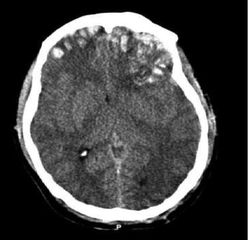TBI Overview

Many would say that their loved ones are different people after their injuries. They talk about a new person emerging as the brain heals and reconnects. For our family, we see so much of Samantha's personality as we knew her before her accident we don't feel like she's a new person -just the way she does some things are different.
She is still a very self confident, determined, driven, patient, co-operative, happy, playful, grateful, sensitive, loving, young woman. Those are the characteristics that make a person. Not the way they walk, talk, eat or depend on others.
Samantha survived that accident and I have never been more proud of her than these last 7 years. The qualities that made her so special all her life are exactly the qualities that are driving her successful recovery from this devastating accident.
She is still a very self confident, determined, driven, patient, co-operative, happy, playful, grateful, sensitive, loving, young woman. Those are the characteristics that make a person. Not the way they walk, talk, eat or depend on others.
Samantha survived that accident and I have never been more proud of her than these last 7 years. The qualities that made her so special all her life are exactly the qualities that are driving her successful recovery from this devastating accident.
The following summary was taken from the Brain Injury Association of America (BIAA) website.
A Healthy Brain
To understand what happens when the brain is injured, it is important to realize what a healthy brain is made of and what it does. The brain is enclosed inside the skull. The skull acts as a protective covering for the soft brain. The brain is made of neurons (nerve cells). The neurons form tracts that route throughout the brain. These nerve tracts carry messages to various parts of the brain. The brain uses these messages to perform functions. The functions include our coordinating our body’s systems, such as breathing, heart rate, body temperature, and metabolism; thought processing; body movements; personality; behavior; and the senses, such as vision, hearing, taste, smell, and touch. Each part of the brain serves a specific function and links with other parts of the brain to form more complex functions. All parts of the brain need to be working well in order for the brain to work well. Even "minor" or "mild" injuries to the brain can significantly disrupt the brain's ability to function.
An Injured Brain
When a brain injury occurs, the functions of the neurons, nerve tracts, or sections of the brain can be affected. If the neurons and nerve tracts are affected, they can be unable or have difficulty carrying the messages that tell the brain what to do. This can change the way a person thinks, acts, feels, and moves the body. Brain injury can also change the complex internal functions of the body, such as regulating body temperature; blood pressure; bowel and bladder control. These changes can be temporary or permanent. They may cause impairment or a complete inability to perform a function.
To understand what happens when the brain is injured, it is important to realize what a healthy brain is made of and what it does. The brain is enclosed inside the skull. The skull acts as a protective covering for the soft brain. The brain is made of neurons (nerve cells). The neurons form tracts that route throughout the brain. These nerve tracts carry messages to various parts of the brain. The brain uses these messages to perform functions. The functions include our coordinating our body’s systems, such as breathing, heart rate, body temperature, and metabolism; thought processing; body movements; personality; behavior; and the senses, such as vision, hearing, taste, smell, and touch. Each part of the brain serves a specific function and links with other parts of the brain to form more complex functions. All parts of the brain need to be working well in order for the brain to work well. Even "minor" or "mild" injuries to the brain can significantly disrupt the brain's ability to function.
An Injured Brain
When a brain injury occurs, the functions of the neurons, nerve tracts, or sections of the brain can be affected. If the neurons and nerve tracts are affected, they can be unable or have difficulty carrying the messages that tell the brain what to do. This can change the way a person thinks, acts, feels, and moves the body. Brain injury can also change the complex internal functions of the body, such as regulating body temperature; blood pressure; bowel and bladder control. These changes can be temporary or permanent. They may cause impairment or a complete inability to perform a function.
|
Injuries of the left side of the brain can cause:
|
Injuries of the right side of the brain can cause:
|
|
Diffuse Brain Injury (The injuries are scattered throughout both sides of the brain) can cause:
|
1.7 million people sustain a traumatic brain injury (TBI) each year. According to the Centers for Disease Control and Injury Prevention, the leading causes of TBI are:
|
Brain injury is unpredictable in its consequences. Brain injury affects who we are, the way we think, act, and feel. It can change everything about us in a matter of seconds. The most important things to remember:
To learn more about brain injury please visit: www.biausa.org. or www.brainline.org
- A person with a brain injury is a person first.
- No two brain injuries are exactly the same.
- The effects of a brain injury are complex and vary greatly from person to person.
- The effects of a brain injury depend on such factors as cause, location, and severity.
To learn more about brain injury please visit: www.biausa.org. or www.brainline.org
